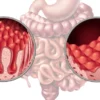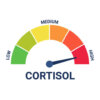
IBS (irritable bowel syndrome) and (IBD) inflammatory bowel disease are two of the most common digestive conditions. While these both involve the digestive symptoms and an overlap in symptoms, these are two distinct conditions.
Read on to understand the differences between the two, how they’re diagnosed as well as how the treatment approach can differ between them.
Understanding IBS vs. IBD
While IBS and IBD may sound similar and share similar gut symptoms such as abdominal pain, bloating and changes in bowel patterns, they are separate conditions.
This means that it’s not possible to experience both at the same time.
However, it may be possible for someone to have an inflammatory bowel disease such as Crohn’s disease or Ulcerative colitis that is in remission and if certain symptoms persist they may then be diagnosed with IBS. [1]
What is IBS
IBS is described as a functional digestive condition that leads to a certain set of symptoms. These symptoms include:
- Bloating
- Abdominal pain
- Constipation and/or diarrhoea
It’s common for these symptoms to increase and decrease over time. IBS symptoms may also worsen after eating certain trigger foods or during periods of high stress.
While the exact cause of IBS is not known, certain imbalances in the gut can lead to these symptoms. For each person with IBS symptoms, a combination of these factors may be the underlying cause.
To be diagnosed with IBS, a certain set of gut symptoms need to be met:
- abdominal pain that is related to bowel movements
- alteration in stool form and/or frequency.
In addition to this, other digestive conditions and diseases need to be excluded. This means that inflammatory bowel disease needs to be excluded and ruled out before a diagnosis of IBS is given. [2]
What is IBD
IBD stands for inflammatory bowel disease and describes 2 main conditions, Crohn’s disease and Ulcerative colitis. In these 2 conditions, inflammation is present in the digestive tract and contributes to tissue damage and a range of digestive symptoms.
The causes of both types of IBD are understood to involve:
- a dysregulated immune system
- an altered microbiota
- genetic susceptibility
- environmental factors (viral infections, food intolerances, chemical exposure)
Both of these forms of IBD can involve periods of remission and relapse. This involves times when symptoms are calm and other times when symptoms increase. The increase in symptoms is often referred to as a flare-up or a relapse. [3]
Similar Symptoms of IBS and IBD
There are certain symptoms that can be common in both conditions.
These similar symptoms can include:
- Abdominal pain/discomfort
- Changes in bowel frequency and form (constipation or diarrhoea)
- Urgent bowel movements
The intensity of these symptoms can vary between patients and the severity of the disease. This can also be related to the different underlying causes of IBS and IBD.
H2 – Key Differences Between IBS and IBD
There are many differences between IBS and IBD.
IBD can be seen as a more severe inflammatory condition of the bowel. This can lead to greater tissue destruction in the affected region of the bowel.
This higher level of inflammation in IBD can lead to more severe digestive as well as non-digestive symptoms.
The digestive symptoms often seen in IBD, and not in IBS, include:
- Blood in the stool
- Mouth ulcers
- Very watery diarrhoea
- An increased number of bowel movements per day
In IBD, there are also symptoms that can appear in regions other than the digestive system. These include:
- Joint pain
- Fatigue
- Irritated eyes
Causes of IBS and IBD
For both IBS and IBD, a single cause is not known. There are however a range of risk factors that can increase the chance of developing these conditions.
In both conditions, the underlying factors in the gut can often consist of 3 main elements.
- Changes in the gut microbiome
- An inflammatory response
- An overactive immune system
The balance and severity of these elements can, however, vary between conditions and individuals.
What causes IBS?
IBS can have a variety of underlying causes. Rather then considering IBS as a specific or single condition, the term IBS refers to a range of symptoms that may be causes by underlying or root causes.
These underlying factors include:
- Food intolerances
- Low-grade inflammation
- Pancreatic insufficiency
- Imbalances in gut bacteria
- Parasitic infections
- Alterations in the gut-brain connection
What causes IBD?
As with IBS, there is not a single cause of inflammatory bowel disease. It is, however, understood to be due to alterations in the immune response in the digestive system.
This can then lead to an inflammatory response which damages the tissue and then leads to the symptoms of IBD.
As already mentioned, there are risk factors for developing IBD. Rather than these being a precise cause, they can contribute to changes in the digestive tract, for example, contributing to low-grade inflammation or change in the balance of the gut microbiome.
These risk factors include the use of antibiotics, early life stresses as well as genetics.
Diagnosing IBS vs. IBD
Diagnosis of both IBS and IBD is made by a doctor or a gastroenterologist via a series of tests.
As IBD needs to be ruled out before a diagnosis of IBS is given, some of the tests for both conditions are similar.
These tests can be carried by practitioners via blood or stool samples. Certain tests are also considered invasive tests, which can include colonoscopies.
How is IBS diagnosed?
The diagnosis of IBS is considered by some as a diagnosis by exclusion. This means that once all other conditions are ruled out, a diagnosis of IBS may then be given.
The conditions that can be ruled out before a diagnosis of IBS is made include:
- Crohn’s disease
- Ulcerative colitis
- Colon cancer
However, even with these conditions ruled out there are further tests and/or causes of the IBS symptoms that can be considered.
These other causes of IBS include:
- SIBO (small intestinal bacterial overgrowth)
- Dysbiosis
- Post-infectious inflammation
- Food sensitivities
- Small intestinal autoimmunity
- Visceral hypersensitivity
- Alterations to the gut-brain connection
How is IBD diagnosed?
The diagnosis of IBD is made based on several factors.
This often begins with a medical history and the evaluation of symptoms. For example, if the symptoms align with certain gut symptoms and clinical features a doctor or specialist may suggest further tests.
However, it is not likely that all of these tests listed below are carried out for each individual.
Clinical features
- Diarrhoea
- Gross or occult rectal bleeding
- Abdominal pain with or around the time of defecation
- Exclusion of intestinal infection (enteric pathogens, e.g. Salmonella, Shigella, Yersinia, Campylobacter, E coli 0157:H7, Clostridium difficile)
Laboratory features
- Iron deficiency anaemia
- Thrombocytosis
- Hypoalbuminemia
- Autoantibodies (GAB, atypical or perinuclear ANCA)
- Elevated faecal calprotectin
Endoscopic features
- Diffuse, continuous involvement of the mucosa starting at the rectum and extending continuously proximally to a variable extent
- Loss of visible vascular pattern
- Loss of haustral folds
- Mucosal erosions and mucosal friability (bleeding when touched by endoscope) or spontaneous bleeding and ulceration
- Oedematous, erythematous appearance of the mucosa
- Pseudopolyps with long-standing UC
- Mucopurulent exudates
Histological features
- Increased mononuclear inflammation in the lamina propria (plasmacytosis)
- Mucin depletion
- Goblet cell depletion
- Crypt distortion, branching and atrophy
- Crypt abscesses [5]
Complications of IBS and IBD
The complications of these conditions can be seen
Complications of IBS include:
- Reduced quality of life
- Decreased mood (depression)
- Nutrient deficiencies
As well as the above, the further complications of IBD include:
- Bowel obstruction
- Anaemia
- Increased risk of blood clots
- Bowel surgery
- Bowel cancer
This can reinforce the need to appropriate treatment of both of these conditions.
Treatment Options for IBS and IBD
For both IBS and IBD, there are common categories of approaches that can be considered to treat these conditions.
These aim to address the underlying factors and imbalances in the gut.
These treatment options include:
- Gut focused supplements
- Dietary adjustments and modifications
- Central nervous system/gut-brain support
When focusing on supplements, there is a range of options that can be helpful for both IBS and IBD.
These can include:
- Probiotics
- Prebiotics
- Medicinal herbs
- Sodium butyrate
- L-Glutamine
Conclusion
With the diagnosis of IBS or IBD, the key part of the treatment is to take into account factors such as the balance of the gut bacteria, levels of inflammation and food intolerances.
Working with a registered gut health practitioner can help to direct and guide you through this process to get your gut health back on track.
References
- Saha, Lekha. “Irritable bowel syndrome: pathogenesis, diagnosis, treatment, and evidence-based medicine.” World journal of gastroenterology vol. 20,22 (2014): 6759-73. doi:10.3748/wjg.v20.i22.6759
- Legaki, Evangelia, and Maria Gazouli. “Influence of environmental factors in the development of inflammatory bowel diseases.” World journal of gastrointestinal pharmacology and therapeutics vol. 7,1 (2016): 112-25. doi:10.4292/wjgpt.v7.i1.112
- McDowell C, Farooq U, Haseeb M. Inflammatory Bowel Disease. 2023 Aug 4. In: StatPearls [Internet]. Treasure Island (FL): StatPearls Publishing; 2024 Jan–. PMID: 29262182.
- Spiegel, Brennan M R et al. “Is irritable bowel syndrome a diagnosis of exclusion?: a survey of primary care providers, gastroenterologists, and IBS experts.” The American journal of gastroenterology vol. 105,4 (2010): 848-58. doi:10.1038/ajg.2010.47
- Conrad K, Roggenbuck D, Laass MW. Diagnosis and classification of ulcerative colitis. Autoimmun Rev. 2014 Apr-May;13(4-5):463-6. doi: 10.1016/j.autrev.2014.01.028. Epub 2014 Jan 11. PMID: 24424198.
History
Updated by Martin Cohen – 13th August 2024







